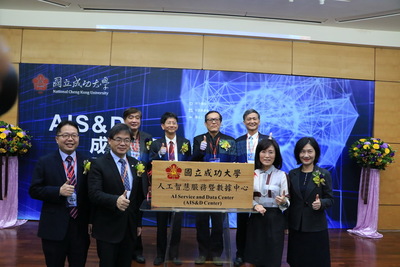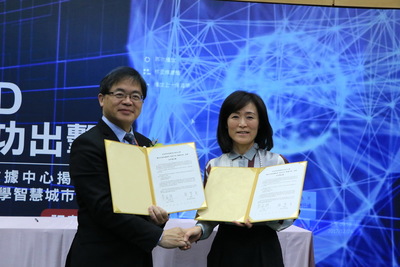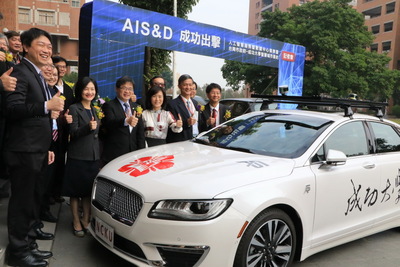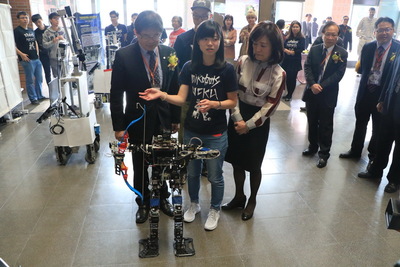Opening ceremony of AIS&D marks a milestone achievement in AI development




The launch of the AI service and data center (AIS&D) on December 26, 2017 confirms the position of National Cheng Kung University (NCKU) as a leader in the field of artificial intelligence. This latest development is the most recent in a proud history: in 1934, the students of the Dept. of Mechanical Engineering successfully built a counting robot; eighty-three years later, the establishment of the AIS&D is a bold declaration of the university’s ongoing commitment to AI research and applications. As the bellwether in the AI field, NCKU has further extended its reach by signing a memorandum of understanding (MOU) with Tainan City Government regarding smart city development.
At the opening ceremony, the AI self-driving car built by NCKU was exhibited outside the venue. With the exception of the auto-body, the creation of this vehicle, including all technologies and applications of artificial intelligence, comprising the sensory devices, judgment and decision-making, driving control, and systemic integration, was achieved by the NCKU-based multidisciplinary team. Vehicle dynamics will be tested at the Guiren campus next year. In commemoration of NCKU’s robotic achievements in 1934, the students of the Department of Mechanical Engineering created a voice-controlled counting robot using industrial waste, with the aim of counting the visitors to the anniversary exposition.
AIS&D has allocated TWD 7 million dollars to the “super computer,” or NVIDIA DGX-1 GPU, which is targeted at the in-depth learning and accelerated analysis of artificial intelligence. Its computing performance equals that of 250 traditional servers, with a total bandwidth of
DGX-1, and speed of 768GB per second.
The AIS&D was founded to provide AI services and assistance to all departments of the university as well as conduct its own AI research through industry-government-academia collaboration and big-data analysis. Relevant curriculum will be provided in the near future.
The R&D director, Sun-Yuan Hsieh, spoke of the three core missions of AIS&D. The center is intended first to provide support for the university’s AI research and development, including intelligent manufacturing, intelligent robots, intelligent aquaculture, and intelligent healthcare. Second, the AIS&D is initiating a collaborative project with Tainan City Government to address the issues of a smart city, digital governance, civil servants’ professional empowerment and big-data analysis. Third, the AIS&D will concentrate on using and analyzing the big data collected for NCKU’s smart campus, in order to improve the environment for both educational and research functions.
The dean of EECS, Wei-Chou Hsu, pointed out that all the colleges of NCKU have been making concerted effort to employ artificial intelligence in various fields, such as intelligent manufacturing, self-driving cars, detection of mycobacterium tuberculosis, analysis of orchid breeding and greenhouse growing systems, long-term care robots, and financial technologies. In short, the AIS&D will not only reap academic results, but also offer valuable help to the industrial and public sectors.
The president of NCKU, Huey-Jen Su, current acting mayor of Tainan, Meng-Yen Lee, and the abovementioned Sun-Yuan Hsieh, and Wei-Chou Hsu jointly participated in the opening ceremony of AIS&D. Shortly afterward, Su and Lee signed the MOU regarding smart-city development. Su stated that the founding of AIS&D serves as a gateway toward improved quality of life for the citizens of Tainan, as well as increased productivity in its industries. Lee stressed the transformative power of artificial intelligence, adding that the intended smart-city cooperation will likely lead to increased employment opportunities in Tainan.
At the opening ceremony, the AI self-driving car built by NCKU was exhibited outside the venue. With the exception of the auto-body, the creation of this vehicle, including all technologies and applications of artificial intelligence, comprising the sensory devices, judgment and decision-making, driving control, and systemic integration, was achieved by the NCKU-based multidisciplinary team. Vehicle dynamics will be tested at the Guiren campus next year. In commemoration of NCKU’s robotic achievements in 1934, the students of the Department of Mechanical Engineering created a voice-controlled counting robot using industrial waste, with the aim of counting the visitors to the anniversary exposition.
AIS&D has allocated TWD 7 million dollars to the “super computer,” or NVIDIA DGX-1 GPU, which is targeted at the in-depth learning and accelerated analysis of artificial intelligence. Its computing performance equals that of 250 traditional servers, with a total bandwidth of
DGX-1, and speed of 768GB per second.
The AIS&D was founded to provide AI services and assistance to all departments of the university as well as conduct its own AI research through industry-government-academia collaboration and big-data analysis. Relevant curriculum will be provided in the near future.
The R&D director, Sun-Yuan Hsieh, spoke of the three core missions of AIS&D. The center is intended first to provide support for the university’s AI research and development, including intelligent manufacturing, intelligent robots, intelligent aquaculture, and intelligent healthcare. Second, the AIS&D is initiating a collaborative project with Tainan City Government to address the issues of a smart city, digital governance, civil servants’ professional empowerment and big-data analysis. Third, the AIS&D will concentrate on using and analyzing the big data collected for NCKU’s smart campus, in order to improve the environment for both educational and research functions.
The dean of EECS, Wei-Chou Hsu, pointed out that all the colleges of NCKU have been making concerted effort to employ artificial intelligence in various fields, such as intelligent manufacturing, self-driving cars, detection of mycobacterium tuberculosis, analysis of orchid breeding and greenhouse growing systems, long-term care robots, and financial technologies. In short, the AIS&D will not only reap academic results, but also offer valuable help to the industrial and public sectors.
The president of NCKU, Huey-Jen Su, current acting mayor of Tainan, Meng-Yen Lee, and the abovementioned Sun-Yuan Hsieh, and Wei-Chou Hsu jointly participated in the opening ceremony of AIS&D. Shortly afterward, Su and Lee signed the MOU regarding smart-city development. Su stated that the founding of AIS&D serves as a gateway toward improved quality of life for the citizens of Tainan, as well as increased productivity in its industries. Lee stressed the transformative power of artificial intelligence, adding that the intended smart-city cooperation will likely lead to increased employment opportunities in Tainan.



